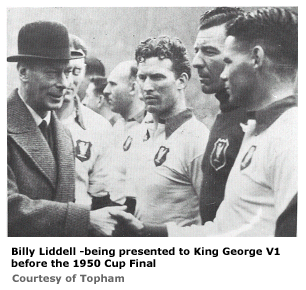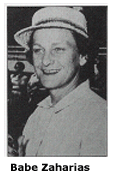|
Charlton beat Burnley in the FA Cup final - during which the ball
burst-for the second successive year! As in golf, modern footballers
have the benefit of a much better ball.
 Two of Britain’s finest ever sportsmen were having their best
seasons that year.
Billy Liddell, a brilliant winger-cum-centre forward, had joined
Liverpool in 1938 on the recommendation of Matt Busby. His exciting
fast-running direct style caused him to be known as the ‘Flying
Scotsman’, a nickname he shared with that other Scottish footballer,
more famous as a golfer, George Duncan. He could well have taken a
cue from George’s book and named his autobiography ‘Football at the
Gallop’, instead of My Soccer Story (Stanley Paul, 1960). Liddell
was the star in the side that took the first post-war league title
in a season considerably lengthened due to an exceptionally hard
winter - the worst of the century. Rivers and Ports froze over and
railways and roads became impassable. Isolated communities had food
supplies dropped by the RAF; almost no coal got through and power
supplies were drastically cut. Snow blanketed the country from late
January to mid March, when the thaw and a great storm brought
widespread flooding. Snow covered pitches were marked out with red
paint, but for many weeks they were unplayable and 140 fixtures were
postponed. Summer had arrived when Liverpool’s backlog of fixtures
was finally completed on a day when the temperature reached 80
degrees Fahrenheit. Two of Britain’s finest ever sportsmen were having their best
seasons that year.
Billy Liddell, a brilliant winger-cum-centre forward, had joined
Liverpool in 1938 on the recommendation of Matt Busby. His exciting
fast-running direct style caused him to be known as the ‘Flying
Scotsman’, a nickname he shared with that other Scottish footballer,
more famous as a golfer, George Duncan. He could well have taken a
cue from George’s book and named his autobiography ‘Football at the
Gallop’, instead of My Soccer Story (Stanley Paul, 1960). Liddell
was the star in the side that took the first post-war league title
in a season considerably lengthened due to an exceptionally hard
winter - the worst of the century. Rivers and Ports froze over and
railways and roads became impassable. Isolated communities had food
supplies dropped by the RAF; almost no coal got through and power
supplies were drastically cut. Snow blanketed the country from late
January to mid March, when the thaw and a great storm brought
widespread flooding. Snow covered pitches were marked out with red
paint, but for many weeks they were unplayable and 140 fixtures were
postponed. Summer had arrived when Liverpool’s backlog of fixtures
was finally completed on a day when the temperature reached 80
degrees Fahrenheit.
Liddell went on to play over 500 games for the Reds and remained
loyal to a club whose fortunes were soon to decline after their post
war success. In a better side he would have won many more than the
two medals he received, one for the league championship and a losing
cup finalist’s medal in 1950.
He was a part-time player and worked as an Accountant for most of
his career, training on only two mornings a week. When he broke into
the first team he was on £5 a week and £4 during the summer. The
maximum wage for footballers was £20/week until 1961, when Liddell
was nearing retirement. (A comparable player in today’s game makes
more before he is substituted in the first match of the season than
Billy made in his whole career) He had pace, courage, skill on the
ball and a blistering shot; many think that he was the greatest
talent ever to grace the Anfield pitch. A Scottish international, he
also played for the British team on the two occasions that the four
home countries combined in international football in 1947 and 1955.
Only he and Stanley Matthews played in both matches against the Rest
of Europe (Neither of these great players was ever booked). Liddell
was a man of religious principles and great integrity. He served as
a magistrate in Liverpool for many years. He passed away in 2001.
The second sportsman to have a great year was to play for Arsenal
(along with his brother Leslie) in the side that beat Liverpool in
that 1950 Cup Final, but he is better known as one of Britain’s most
talented cricketers. After the hardest of winters came the glorious
summer of 1947 and Denis Compton scored 18 centuries, breaking the
record of 16 made by Jack Hobbs in 1925. The Middlesex batsman
totalled 3,816 runs at an average of 90.85. In the five match test
series against the South African tourists he scored 753 runs to help
England to victory by three tests to nil.
 In 1948 one of the World’s greatest ever all-rounders, ‘Babe’
Zaharias, won the US Women’s Open Golf Championship – the first of
her three victories in the event. In her amateur career she won the
US Amateur Championship in 1946 and the British Amateur title the
following year- the first American victory in the event. The former
All-American basketball and baseball player, was nicknamed ‘Babe’
after Babe Ruth, when she hit five home-runs in a game. She had been
the first woman to make the cut in a men’s professional golf
tournament in the 1945 Los Angeles Open; it was to be 58 years
before it was done again-by Se Ri Pak in 2003. Bobby Jones said she
was one of the best 10 golfers of all time – male or female. Widely
regarded as the greatest female athlete of the 20th century, as
Mildred Didrikson, the In 1948 one of the World’s greatest ever all-rounders, ‘Babe’
Zaharias, won the US Women’s Open Golf Championship – the first of
her three victories in the event. In her amateur career she won the
US Amateur Championship in 1946 and the British Amateur title the
following year- the first American victory in the event. The former
All-American basketball and baseball player, was nicknamed ‘Babe’
after Babe Ruth, when she hit five home-runs in a game. She had been
the first woman to make the cut in a men’s professional golf
tournament in the 1945 Los Angeles Open; it was to be 58 years
before it was done again-by Se Ri Pak in 2003. Bobby Jones said she
was one of the best 10 golfers of all time – male or female. Widely
regarded as the greatest female athlete of the 20th century, as
Mildred Didrikson, the
NEXT
|